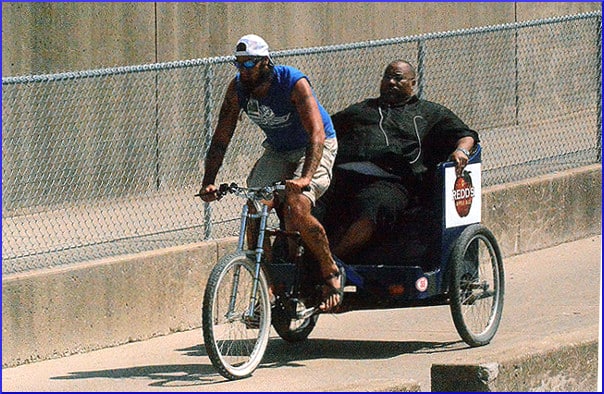
If people can be motivated to change their obesity lifestyles for the sake of a potential marriage partner, or for the sake of a child, that’s a wonderful thing. However, it also means that they can be manipulated in the other direction, supposedly for the sake of love. Insecure individuals have been known to fatten up their spouses on purpose, hoping to prevent other potential emotional connections. Parents have been known to intentionally fatten their kids, hoping to protect them from the dangers of the sexual arena.
People do these things because of emotion that while genuine, is erroneously expressed. The bottom line is, although love can motivate toward the good (for example, healthy weight loss) it can also motivate toward harm (for example, by encouraging and enabling a lady’s ambition to be the world’s heftiest lingerie model.)
In other words, the love of a partner or a child can come at too high a price. It can be an ever-tightening noose. A partner, or even a parent, might purposely steer a morbidly obese person in the direction of increasing weight gain, for their own selfish or delusional reasons, which is a toxic degree of enabling.
“The foul rag and bone shop of the heart”
That line is from the poetry of W. B. Yeats, and it fits. Things can go the other way, with the obese person manipulating family members and friends. In the home of a parent who is virtually immobile, like the unfortunate subjects of obesity-focused reality shows, minor children may have no realistic choice but to stay. Even an adult relative or friend might hang in there and help because of moral obligation, or because they don’t have anywhere else to go.
A morbidly obese person might use the power bestowed by the fact that others have limited choices. A manipulative person might use the power of love to keep a parent or child in thrall. A morbidly obese person, who after all is technically sick, can turn somebody into a food-bringing servant by pouring on the emotional abuse until the demands for food are met.
Lisa Swan, reporting on the TV series “My 600-lb Life,” wrote:
No one on the show gets fat without enablers… In some instances, the obese participants will make their caretakers’ lives miserable by hollering and throwing fits until they get what they want. In other cases, the enablers are also heavy, albeit not as heavy, and they don’t want to change their own diets. In other cases, the enablers seem to want to be in a caretaker role.
Swan mentions Marla McCants, an 800-pound self-identified junk-food junkie, who says of eating, “I love the way it makes me feel” — and whose family wants to make her happy, so they go along. The writer also speaks of a housebound obese man who made his daughter quit school to take care of him, which is seriously abusive.
She tells of a woman who lost 500 pounds, only to have her husband leave because what he really enjoyed was being in charge of a helpless, bedridden woman. Once she got on her feet, he felt rejected and unneeded, and couldn’t handle the new status of equality.
Another morbidly obese woman’s husband quit because he didn’t want to be involved with the responsibility and fuss of helping her lose weight. Even though she couldn’t leave the house, this patient managed to find a new boyfriend anyway.
And what are we to make of a husband who would fetch his wife from the weight-loss-surgery hospital, and stop at a fast-food joint on the way home? Swan writes,
Most of the relationships on the show change — some for the worse — after weight loss surgery. Some of the partners are overweight as well, and their partners’ weight loss threatens them. In some of the relationships, the partner doesn’t want their “loved one” to change. Others want to feel needed, so the weight loss threatens them… Some of the partners are so-called “fat admirers” who have a fetish for fat women, and want them to stay fat.
This all adds up to a very important question, and here it is: How can any professional, anywhere, ever deny the unignorable fact that mental health is a giant component of the obesity picture?
Your responses and feedback are welcome!
Source: “The untold truth of My 600-lb Life,” TheList.com, 08/05/16
Photo credit: Steve Baker on Visualhunt/CC BY-ND

 FAQs and Media Requests:
FAQs and Media Requests: 











